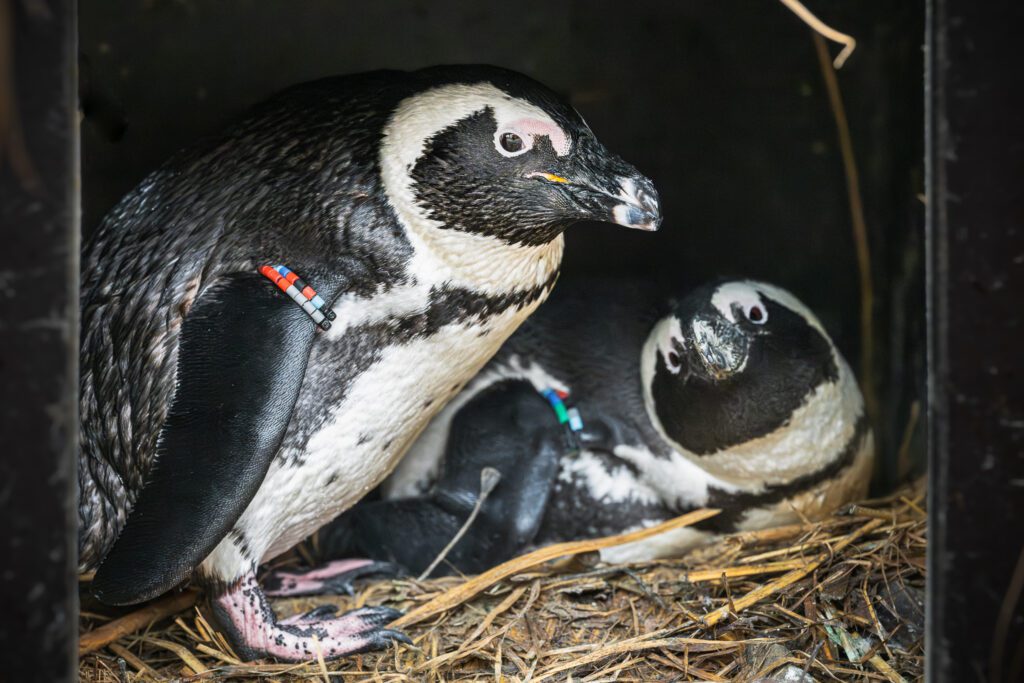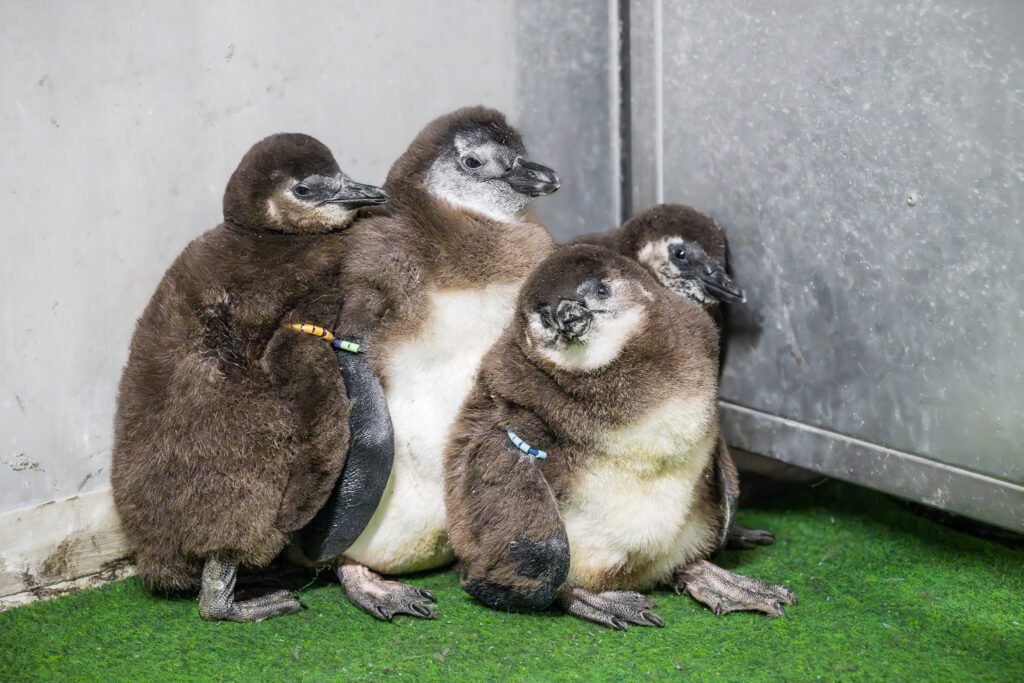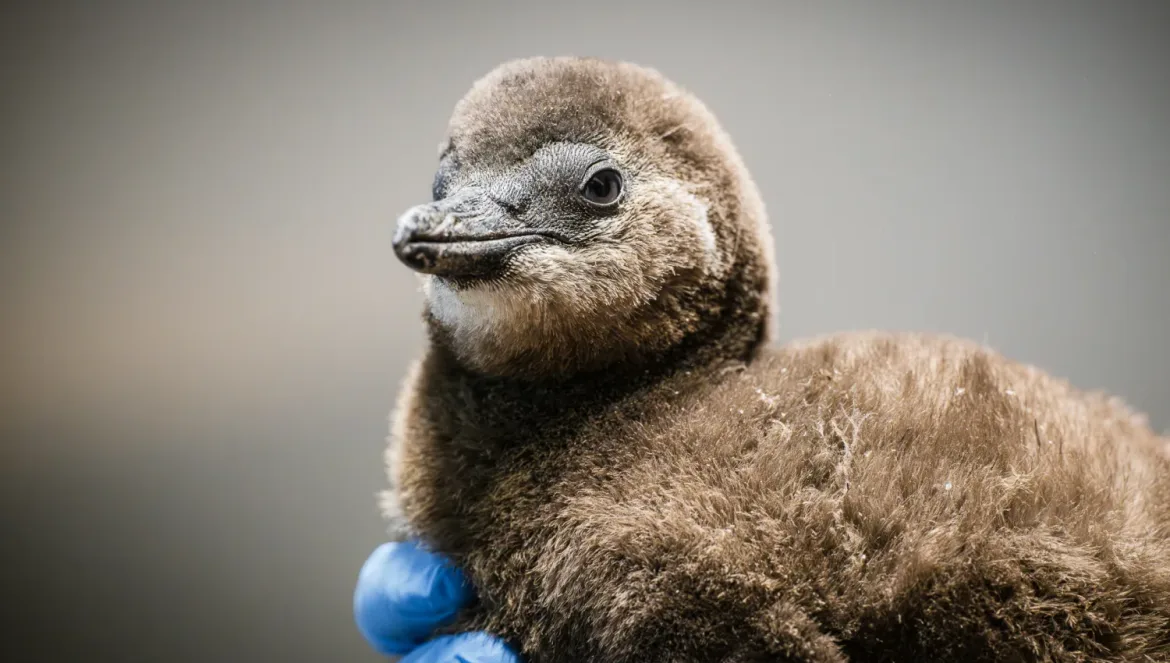A pair of young male spectacled penguins from Amsterdam adopted a chick in SAFARI PARK in Dvůr Králové. They have been living in a same-sex union for the second season. The pair received custody of the chick from a pair that laid two eggs. The chick was hatched and raised. Their parental role is over and the little penguin faces a difficult period of independence. The remarkable story has its fairy tale-like climax set in the Christmas season.
Grayish down feathers, a stocky body and mischievous eyes. The little spectacled penguin, hatched on October 30 this year, looks at first glance like its littermates, but has an extraordinary story behind it. Its parents are two males. "The chick was raised by a pair of young males who came to us from Amsterdam. In order to maximise the number of chicks raised, we placed an egg in their nest from a pair that had laid two fertilised eggs. In our experience, two chicks cannot be raised by one pair, so we gave two young males a chance," says the zoologist Michal Podhrázský.
It is not yet won, but the chick has already moved from the nesting burrow to the background, where it is learning to accept fish from the hands of the keepers. This is a common practice in penguin breeding.
"Crosby and Fleury are actually lucky they're birds, not people. Because they couldn't adopt and raise a chick in our country. The most common argument against same-sex couples adopting children is that it's against nature. Yet there are many cases of chicks being raised by mothers and aunts alone, with no male involvement. These are very intelligent elephants, for example, known for their strong social bonds. And our Christmas story, which is not unique in itself, proves that two males can successfully care for a cub. So let's not be afraid to take inspiration from nature." glosses the director of SAFARI PARK Přemysl Rabas.

Crosby and Fleury, as the breeders call the pair of male penguins, hatched in the Dutch capital in autumn 2021, so they are relatively young. "Last year we attributed the fact that they did not get a female in the flock to their very young age and little experience. Since then, however, they have stayed together and even outside of breeding season they are often paired. They also like to discover new things together in the exhibit and such. They're basically inseparable, which is not exactly common with penguins," adds Michal Podhrázský. The spectacled penguin from southern Africa is now classified by scientists as critically endangered. It is therefore desirable for breeding flocks to produce young. "Hatching does not automatically mean breeding. This has been confirmed several times. In the past, we have laid eggs of another pair of males, but the breeding failed the first time. Now everything is on track," explains the zoologist.
Once a breeding pair has laid eggs, zoologists remove them after 15 days and screen them. To determine if it's fertilized. If a single breeding pair has two fertilised eggs, the experts will split them up. The fertilized eggs go under the pairs that don't have fertilized eggs. And in this case, to two mated males. Even with this strategy, the little penguin is not the only addition of the season. In addition to him, three more chicks are growing up in a special nursery in the hinterland - another, the last of the season, will join them as scheduled on December 27.

The sex of the chicks is not yet known. "Only DNA analysis of the giant feathers will reveal it. The young birds will molt in late January. At that time, they will also join the adult group, where visitors will see them," reveals Michal Podhrázský.
The Pikkewyn Baai penguin exhibit, which is part of the West Cape complex, is still normally accessible. People can go directly among the penguins: the exhibit, which is the largest in the country, is walk-through. Its similarity is reminiscent of the port towns in Namibia, where penguins live in close proximity to humans. They are also their biggest threat and enemy. These amazing birds have been driven to the brink of extinction.
The spectacled penguin is the only African penguin. Reclassified by science as critically endangered, they continue to decline - to less than half their original numbers since the 1980s. As a result of habitat loss, they are relatively common near human settlements. Despite this, humans remain its greatest enemy, due to the plundering of the fish's natural resources. This leaves little food for penguins and other marine animals. The indirect threat of being trapped in trawl nets or dumping waste into the seas and oceans is also becoming more serious. Microplastics are also a major problem. Eyeglass penguins are relatively monogamous, with pairs being faithful to both breeding burrow and partner for at least several years. Apart from Dvůr Králové, only the Ústí nad Labem Zoo breeds spectacled penguins in the Czech Republic and Slovakia.
safaripark/ gnews.cz - RoZ



